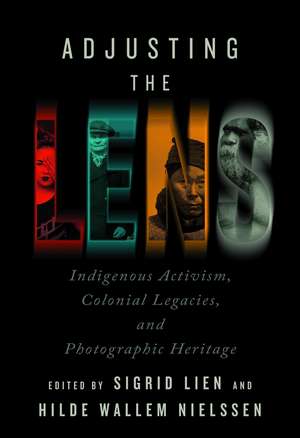Adjusting the Lens: Indigenous Activism, Colonial Legacies, and Photographic Heritage
Editat de Sigrid Lien, Hilde Wallem Nielssenen Paperback – 2 dec 2021
Apparently neutral windows into the past, colonial photographs lie at the center of Indigenous art activism across the globe. Through a series of moving case studies, Adjusting the Lens explores how Indigenous artists in Australia, Canada, Finland, Greenland, Norway, and the United States today confront and redevelop this archive as they strive to empower and revitalize their communities and decolonize the historical record.
Preț: 401.82 lei
Nou
Puncte Express: 603
Preț estimativ în valută:
76.92€ • 79.96$ • 63.78£
76.92€ • 79.96$ • 63.78£
Carte indisponibilă temporar
Doresc să fiu notificat când acest titlu va fi disponibil:
Se trimite...
Preluare comenzi: 021 569.72.76
Specificații
ISBN-13: 9780774866613
ISBN-10: 0774866616
Pagini: 322
Ilustrații: 67 halftones
Dimensiuni: 165 x 241 x 25 mm
Greutate: 0.85 kg
Editura: University of British Columbia Press
Colecția University of British Columbia Press
ISBN-10: 0774866616
Pagini: 322
Ilustrații: 67 halftones
Dimensiuni: 165 x 241 x 25 mm
Greutate: 0.85 kg
Editura: University of British Columbia Press
Colecția University of British Columbia Press
Notă biografică
Sigrid Lien is professor of art history at the University of Bergen, Norway. She is the author of Pictures of Longing: Photography and the Norwegian-American Migration, among other works. Hilde Wallem Nielssen is professor of intercultural studies at NLA University College, Bergen, Norway, and the author of Ritual Imagination: A Study of Tromba Possession among the Betsimisaraka in Eastern Madagascar, among other works.
Recenzii
"Perfectly timed and enormously significant, Adjusting the Lens illuminates the ways Indigenous art activists use photographs to challenge, realign, and renegotiate past histories....What makes this volume so critically important is that it brings to light practices that rewrite long-held myths of how colonialism utilized photography as evidence, making it the singular historical record."
“Adjusting the Lens is a cutting-edge and timely study of Indigenous photography, and is a pleasure to read from beginning to end. Everyone interested in the use and circulation of Indigenous images along with contemporary engagements with photographic collections by descendant communities will find this groundbreaking and powerful collection incredibly useful.”
